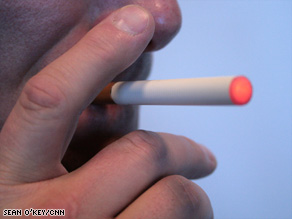
At first glance, it looks like the real thing. It’s white, with a brown filter. When the tip glows red, a smoke-like puff follows. But this is not a typical cigarette — it’s an "e-cig." A what? An electronic cigarette.
Makers of e-cigs tout their product as the first healthy cigarette, free of harmful chemicals and tar typically found in tobacco products. The only ingredient: pure liquid nicotine. “Our product is comparable to the nicotine patch except people still get the oral fixation, which they love,” explained Elicko Taieb, CEO of Smoking Everywhere, one of the largest distributors of electronic cigarettes. But the U.S. Food and Drug Administration considers e-cigs an unapproved new drug because of a lack of scientific proof that they’re safe or effective. The FDA is trying to halt importation of e-cigs, but isn’t seizing products already being sold in the United States. “The FDA has been detaining and refusing importations since at least last summer of these so-called ‘electronic cigarettes,’ ” FDA spokesperson Rita Chappelle told CNN in a written statement. Smoking Everywhere is “pretty sure” the product is safe, based on laboratory testing in Europe, Taieb said. The company declined a CNN request to review safety reports. “There are no ingredients in our e-cigs that can cause cancer. However, it is a pretty new product, so we are not 100 percent sure of the side effects at this point,” Taieb said. “But we haven’t heard of any negative side effects yet, but we are pretty sure they are safe.” Electronic cigarettes run on a battery. A person inhales an e-cig as he or she would a typical cigarette. When inhaled, the battery warms liquid nicotine stored in a plastic filter. The combination of heat and liquid creates the vapor or “smoke” puff when exhaled. Health experts say the idea of an electronic cigarette is a great alternative to tobacco smoke but more evidence is needed.
Health Library
MayoClinic.com: Nicotine dependence
“Nicotine is not the thing in tobacco smoke that causes cancer, but inhaling pure nicotine may be dangerous,” said Dr. Steven Schroeder, physician and smoking cessation expert at the University of California-San Francisco Medical Center. “We have no clue what the health effects could be.” Nicotine replacement therapies — the patch or gum — are safe and highly successful to help quit smoking. Tobacco smoke causes nearly 90 percent of lung cancer deaths, according to the American Cancer Society. “If it is a choice between smoking tobacco product or a nicotine replacement — of course, keep taking the nicotine,” Schroeder said. “It is a heck of a lot healthier than tobacco smoking.” Developers of e-cigs echo the thought. “We aren’t claiming electronic cigarettes help you quit altogether, but I promise our product won’t cause cancer. So no matter what way you look at it, it’s the healthier option,” Taieb said. Smoking Everywhere sells thousands of electronic cigarettes a day in the United States, the company said. Most are sold online or in 100 mall kiosks across the states. The company, which gave samples of e-cigs to celebrities at this year’s Grammy and Oscar awards, said it expects that “big-name” actors will soon promote the product. U.S. sales are expected to double in 2009. Sales of e-cigs have been on the rise in the United Kingdom, Geneva, Sweden and Brazil for several years. The trend prompted the World Health Organization to issue a statement in 2008 calling for more safety testing. “If the marketers of the electronic cigarette want to help smokers quit, then they need to conduct clinical studies and toxicity analyses,” the statement said. The idea that that e-cigs may be a good tobacco smoke alternative in the future could hold true, the FDA and WHO acknowledged, but proof of the product’s safety must come first.